Each debate was accompanied by a background note provided by the Mo Ibrahim Foundation, providing key facts and figures.
Ahead of the European Union-African Union summit, 17-18 February 2022, the Africa-Europe Foundation organised a series of debates on three key topics of shared interest.
Despite the lack of data on infection rates, WHO studies in 11 African countries suggest nearly 70% of their population could have some conferred COVID-19 immunity (as of September 2021).







1 in 7
The COVID-19 pandemic seemed to have had a much milder impact in Africa than in Europe. Cumulative COVID-19 cases per 1 million population are nearly 25 times higher in the EU than in Africa (as of January 2022).
However, the impact of COVID-19 in Africa may be greatly under-estimated: according to the World Health Organization (WHO), roughly one in seven COVID-19 infections are being detected in Africa.
Vaccine inequity
By 27 January 2022, COVID-19 vaccine doses administered in Africa accounted for less than half of the amount administered in the EU, for a population that is more than three times larger.
Only seven out of 54 African countries have reached the 2021 year-end WHO target of fully vaccinating 40% of their people, compared to 26 out of 27 EU countries. Meanwhile as of 27 January 2022, booster doses administered in the EU amounted to more than half the total doses administered in Africa.
Africa
10.2%
72.0%
EU
Africa
population
COVID-19 fully vaccinated
COVID-19 fully vaccinated
EU
population
Donating vaccines is one thing but ensuring that they really make it into people’s arms is another thing. True equity demands more than donations.
Jutta Urpilainen

Africa
EU
Population


Delivery and distribution challenges
Team Europe - which combines resources from the EU, its member states, and European financial institutions - has committed to donate 700 million COVID-19 vaccine doses, either directly or through COVAX (the vaccine pillar of ACT-A), by mid-2022.
However, by 6 December 2021, only 353.4 million doses had been provided, of which only 118 million have already been delivered.
It is possible to increase capacity in terms of vaccinations but we need funding, political will, and, first and foremost, sustainable investment in health systems to make it work.
Abou Kampo

Africa faces additional challenges with multiple distribution bottlenecks, such as the lack of trained health workers, basic equipment shortages, weak transport networks, and growing vaccine hesitancy among African citizens.
It is possible to increase capacity in terms of vaccinations but we need funding, political will, and, first and foremost, sustainable investment in health systems to make it work.
Abou Kampo

Looking ahead: building Africa’s vaccine autonomy
Africa accounts for 25% of global vaccine demand but currently imports 99% of its routine vaccine needs, with African vaccine manufacturing capacity almost non-existent.
Boosting this capacity is therefore key to achieving health security.
COVID-19 vaccine manufacturing in Africa is expected to ramp up in 2022, increasing the availability of vaccines on the continent, with a number of important developments currently underway.
Africa: vaccine needs (2021)
1.0%
About 12 million doses are manufactured in Africa
We need to make sure that the investment is sustained beyond the current emergency.
Tamsin Rose




99.0%
of doses are imported

Launched in April 2021, the Partnership for African Vaccine Manufacturing (PAVM) aims to boost Africa’s ability to deal with its general vaccine needs by 2040.
But there are multiple challenges to address on the road to Africa’s vaccine manufacturing autonomy: Intellectual Property Rights and technology transfers; creating a relevant market size; governance and regulatory & quality control frameworks; infrastructure environment; access to finance; and health workforce capacities & expertise.
AU-EU partnership
A key pillar of the 6th EU-AU Summit is the Team Europe Initiative (TEI) on Manufacturing and Access to Vaccines, Medicines and Health Technologies in Africa (MAV+).
MAV+ is an integrated and comprehensive support package that aims to tackle barriers to manufacturing and access to health products and technologies in Africa.
It works at continental, regional and national levels to strengthen the African pharmaceutical system and regional manufacturing capacities.
Only together can we find sustainable, inclusive, longstanding solutions for both continents.
Jutta Urpilainen




